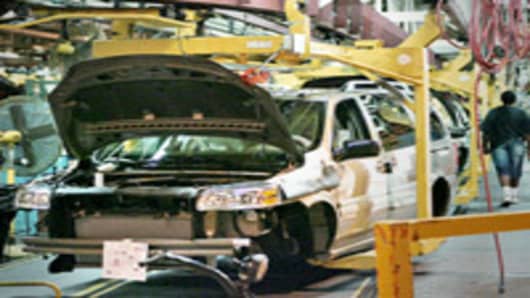Senate negotiators sought to craft a compromise plan to bail out distressed US auto makers, though prospects for a deal before Congress adjourns for the year remained remote.
With a Democratic proposal to use $25 billion from the Wall Street bailout fund stalled due to weak support, the emphasis shifted to a plan endorsed by Republicans and the White House.
That proposal would allow auto companies to draw emergency loans from the $25 billion fuel-efficiency fund that Congress approved in September. That money has not yet been distributed by the Energy Department.
But Democratic leaders have rejected such a course, and environmentalists don't want that money used for anything other than its intended purpose.
As a result, prospects for a deal were far from certain with time running low on the abbreviated congressional session.
Minority Leader Mitch McConnell said that the Republican compromise effort "is the only proposal being considered" that has any chance of becoming law now.
"There is a way forward that will help protect the jobs in the auto industry, while also protecting taxpayers," McConnell, a Kentucky Republican, said.
But Senate Banking Committee Chairman Chris Dodd, D-Conn., was downbeat, calling the possibility of reaching agreement "remote."
"I don't see how in the next few days this is going to move forward," Dodd told reporters. Still, he added, "That does not mean that there are not opportunities."
The deadlock persisted even as the heads of General Motors, Ford and Chrysler returned for a second day to plead for relief and as their congressional backers urged colleagues not to punish them for past mistakes.
GM CEO Rick Wagoner told the House Financial Services Committee that collapse of the U.S. auto industry could lead to a loss of 3 million jobs within the first year and ripple throughout communities around the nation.
Video: Wagoner talks to CNBC about bailout.
In sometimes contentious testimony, Wagoner was pressed on when GM would run out of money if the loans weren't extended. He said he couldn't say precisely, but that the company now was burning through "$5 billion each month."
Still, with the $25 billion emergency package, "We think we have a good shot to make it through this," Wagoner said. He said he anticipated that, if the package is approved, GM would qualify for about $10 billion to $12 billion of the money.
Democratic Sen. Carl Levin of Michigan, meanwhile, urged the House committee not to let differing views about the source of US automaker loans hold up the aid.
"Are we going to permit a difference over the source of these loans to destroy an opportunity to help an industry so essential to this country?'' Levin asked.
Republican Ohio Sen. George Voinovich, whose state also could be devastated by a collapse of the auto industry, said he hopes Congress can reach a deal by the end of Wednesday.
"We are having a lot of discussions with the Democrats,'' said Voinovich, noting a growing consensus "of getting something done so we don't lose General Motors.''
Senate Majority Leader Harry Reid, a Democrat, also hopes the Senate can pass a bill this week. However, "no one should be overly concerned if we are unable,'' Reid said.
But investors did seem concerned, as General Motors and Ford shares fell on the uncertainty of the bill's passage.
Chrysler Hopes To Revive GM Merger Talks
Separately, the Financial Times reports that Chrysler LLC hopes to restart merger talks with General Motors after a government bailout package is finalized allowing the companies to
address liquidity problems, citing an unnamed person familiar with recent discussions.
Talks between the companies were "still going on at a very low level" and would be restarted "immediately" if the bailout was approved, the source said, according to the newspaper on its Web site. "The talks were suspended while this process played out to see where everyone
was," the newspaper quoted the source as saying.


